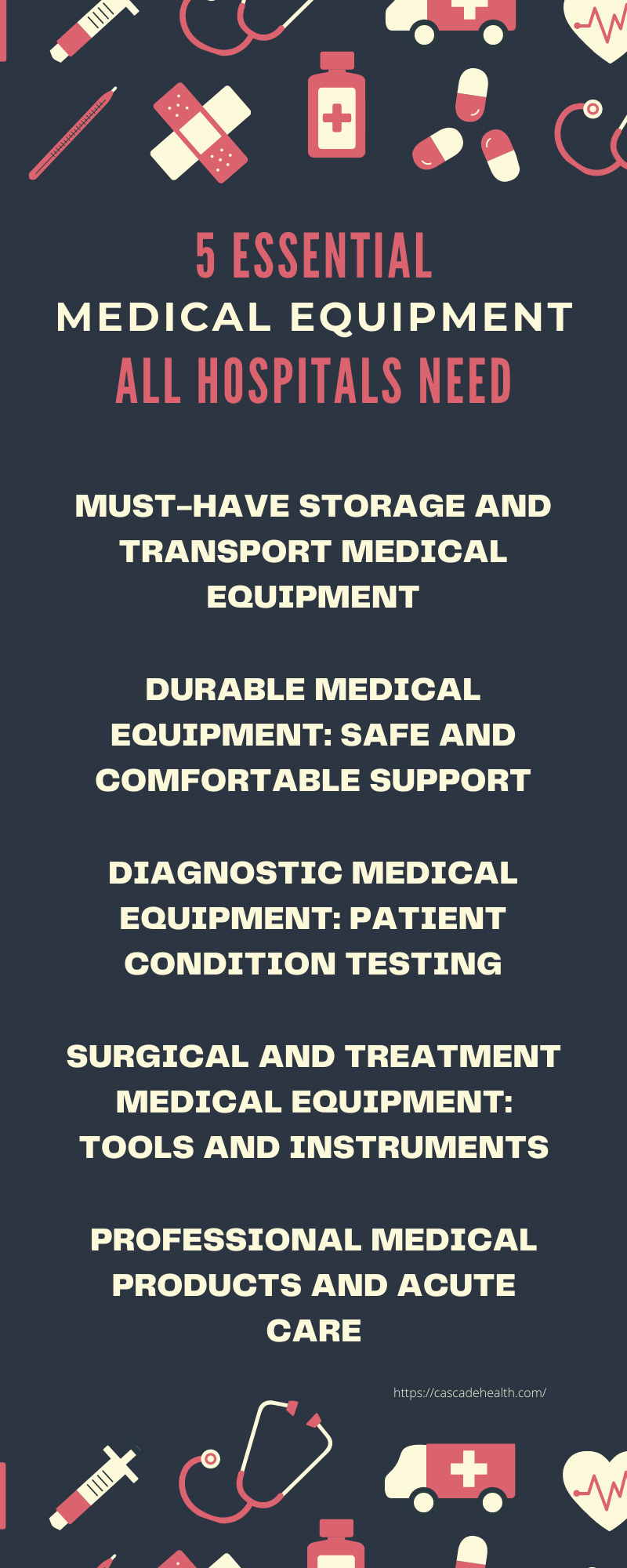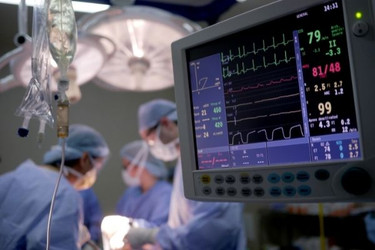5 Essential Medical Equipment All Hospitals Need
Dec 14th 2021
Nothing is of higher importance in present-day hospitals and clinics than the acquisition and utilization of quality medical equipment. Those in medical professions—including physicians, nurses, and other healthcare professionals—require functional equipment to treat their patients to the fullest extent. Having key pieces of medical supplies on hand 24/7 is a necessity to support superior patient care—not to mention providing the best possible outcomes for all.
Each healthcare organization deals with countless situations, medical emergencies, and misfortunate events day in and day out. Medical facilities of all sizes need to be readily equipped for anything that may come through their own doors. We've gathered together a general compilation of the basic gear, supplies, and equipment required to practice quality care. A wide array of diverse equipment categories are available on the market, but the main groupings include:
- Storage and transport equipment
- Durable medical equipment
- Diagnostic medical equipment
- Surgical and treatment medical equipment
- Professional medical and acute care products
Let’s examine closer these top five types of essential medical equipment all hospitals need. All of the essentials must work together coherently to appropriately meet patient care demands.
Must-Have Storage and Transport Medical Equipment
When handling emergencies and managing patients, storing, carrying, and transporting are primary actions in healthcare settings. Ergo, the right storage and transport of medical equipment are an absolute must-have for medical facilities, healthcare clinics, and hospitals as patients pass through provider's care.
Systematic medical equipment management and maintenance are how hospitals can best optimize their facilities for the greatest efficiency. Protecting and organizing medical supplies with adequate resource solutions helps each piece of equipment last for its intended lifespan. Medical equipment management is of the utmost importance to ensure an accurate and adequate inventory at all times.
This category can be further split into sub-classes for medical supplies themselves. Case carts, storage carts, and utility carts are commonplace to bring varying supplies directly to patients or medical professionals. Types of medical supply storage options include colored storage bins, lockable medication boxes, clear-view cabinets, stack and hang items, assorted drawers, wire shelving units, desktop and computer accessories. Clearly-labeled storage and disposal systems are critical for patient and staff safety.
Durable Medical Equipment: Safe and Comfortable Support
Durable and supportive gear is another of the main types of essential medical equipment all hospitals need. These reusable healthcare requirements may appear minute in comparison to others on the list. However, ensuring patient comfort, support, and safety is of the essence. Found in clinical and home care settings alike, each item is customarily utilized for medical purposes due to specific conditions or illnesses.
As patients route through their care in facility settings, high-quality stretchers, tables, canes, walkers, crutches, wheelchairs, and ergonomic beds are top-notch general equipment to have on hand for repeated use. Innovative technology, design, and mechanics have made these supplies with advanced features, such as non-slip and load-bearing strength. Other durable devices for therapeutic purposes and daily activities include kidney machines, CPAP machines, traction materials, oxygen, monitors, nebulizers, and lifts.
Diagnostic Medical Equipment: Patient Condition Testing
Medical professionals use diagnostic equipment to uncover, diagnose, and properly treat patient conditions. This equipment category is pivotal to detect certain abnormalities in body systems and organs causing current patient symptoms.
Imaging Machines
Some of the most commonly utilized diagnostic digital health tools in ERs, outpatient care centers, and hospital units are imaging machines. Medical imaging refers to the radiological techniques and processes that create images. Physicians can critically examine and observe internal body parts without the need for surgical cutting. X-ray machines, MRI machines, and CT scan machines are all a part of this essential list.
Diagnostic Instruments
Other prevalent diagnostic instruments and testing tools allow clinicians and healthcare professionals to observe particular facets of patient health. The most easily recognizable tool is a stethoscope to listen to heartbeats, lung function, and blood flow. Other key pieces in this category include vital sign monitors, scales, thermometers, sphygmomanometers, otoscopes, ophthalmoscopes, ECG and EKG heart-rate units, dopplers, fetal monitors, hematology analyzers, glucose metes, pulse oximeters, penlights, and ultrasound devices.
Surgical and Treatment Medical Equipment: Tools and Instruments
The majority of modern hospitals provide essential surgical and treatment procedures to improve patient health. Top-of-the-line technological equipment and supplies are necessary to perform these types of life-saving and life-changing medical interventions. Success often depends on the accuracy of such crucial tools and instruments.
Surgical Gear
To perform any surgery, personal protective equipment, electrosurgical units, and lighting are essential. No procedural equipment list would be complete without adjustable tables and trolleys for varied heights and support systems. Expert surgeons and physicians require specialized tools and devices for the actual operation at hand. Every hospital needs anesthesia equipment, respiratory equipment, and other medical-grade instruments. Alongside grasping tools—such as clamps and forceps—mechanical cutting tools such as scalpels, scissors, and lancets are integral. Resuscitation, sterilization, suction, and suture tools are supplementary requisites for safe and successful surgical procedures.
Treatment Necessities
Hospital treatment necessities encompass core devices that restore health and function in affected organs or tissues or fight off infections or illnesses within the body. These specifically-designed treatment tools include infusion pumps, hygiene pumps, dialysis pumps, syringes, medical lasers, incubators, IV delivery units, nutritional and food delivery systems, transfusion sets, and cardiac and pulmonary support, among others.
Professional Medical Products and Acute Care
The last grouping to round out this list of essential equipment for hospitals and clinical settings is miscellaneous medical care products. Healthcare providers know that day-to-day operations may vary and often require diverse supplies for patient care. Besides highly specialized equipment, preparing general-purpose products for use is key to maintaining an outstanding facility or comprehensive care center.
Wound and skin care kits and non-surgical tools are ideal for daily use. Minor procedures and acute care require single-use supplies such as antiseptic wipes, gauze, cotton pads and swabs, tissues, adhesive bandages, tweezers, hypodermic needles, medical tape, skin closure strips, disinfectants and germicidal, and more. Birthing supplies are especially vital to have and possess full knowledge of due to hundreds of thousands of babies being born each day worldwide.
At Cascade Health Care, we supply a diversified range of professional medical products for purchase online, including dopplers, diagnostics, and midwifery supplies. We specialize in high-quality products that are available for all kinds of healthcare providers worldwide. Glance over the current inventory on our website for medical devices, customizable kits, tools, and educational materials that fit your needs.


